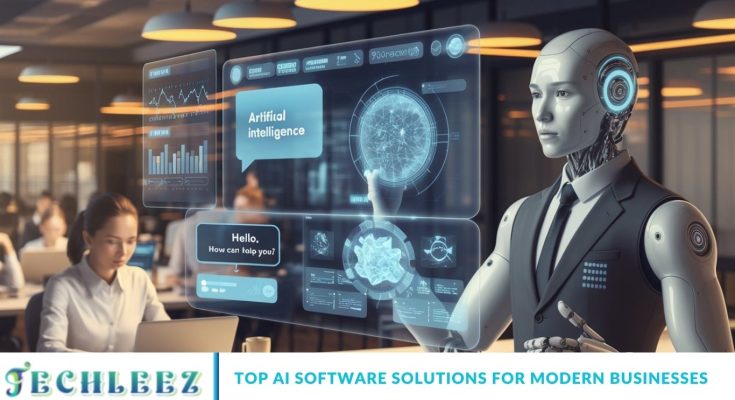Artificial Intelligence (AI) has evolved beyond a buzzword to become a core driver of innovation across various industries. From automating processes to enhancing customer engagement, AI software solutions are enabling businesses to operate smarter and faster. If you’re looking to stay competitive in today’s market, integrating AI into your operations is no longer optional—it’s essential.
What Are AI Software Solutions?
AI software solutions are advanced digital tools that simulate human intelligence to perform tasks such as learning, analyzing, problem-solving, and decision-making. These systems streamline operations, analyze massive datasets, and help deliver customized experiences—all without human intervention. For modern businesses, AI acts as a digital co-pilot that enhances productivity and performance.
Common Types of AI Applications for Business
AI comes in various forms, each tailored to solve specific business challenges:
- Automation Platforms: Eliminate repetitive tasks such as data entry, invoicing, or scheduling.
- AI Chatbots: Provide instant customer service and resolve common queries without requiring human intervention.
- Data Analytics Tools: Discover patterns and generate predictive insights from large datasets.
- Recommendation Systems: Deliver personalized content and product suggestions based on user behavior.
Significant Benefits of AI Software Integration
Streamlined Operations and Efficiency
AI tools automate routine functions, helping businesses save time and reduce operational costs. This allows employees to focus on high-impact, strategic tasks.
Smarter, Data-Driven Decision-Making
AI platforms can process vast amounts of data and extract meaningful insights. Whether it’s analyzing consumer behavior or forecasting market trends, AI supports confident decision-making.
Enhanced Customer Experiences
With AI, businesses can deliver highly personalized and responsive experiences. Tools like chatbots and AI-driven recommendation engines foster better customer satisfaction and loyalty.
Core AI Technologies Driving Business Transformation
Machine Learning (ML)
ML allows systems to learn from data patterns and improve over time. It’s widely used for fraud detection, churn prediction, and sales forecasting.
Natural Language Processing (NLP)
NLP helps AI systems understand and respond to human language. It powers virtual assistants, customer support bots, and automated content moderation.
Computer Vision
AI with computer vision can interpret visual inputs such as images or videos, aiding in tasks like facial recognition, product inspections, and augmented reality applications.
Predictive Analytics
Using historical data and AI algorithms, predictive analytics enable forecasts of future outcomes, making them ideal for supply chain planning, customer segmentation, and risk assessment.
Industries Benefiting from AI Software Solutions
Healthcare
AI enhances diagnostics, predicts patient outcomes, and supports telemedicine platforms. It improves both clinical efficiency and patient care.
Finance
Financial institutions use AI for fraud detection, loan risk assessment, and algorithmic trading, all while ensuring faster and more accurate decision-making.
Retail
Retailers deploy AI to personalize shopping experiences, optimize inventory, and target marketing efforts based on customer behavior analytics.
Manufacturing
AI ensures smooth operations through predictive maintenance, real-time quality checks, and demand forecasting.
How to Choose the Right AI Solution for Your Business
Identify Specific Business Needs
Start by pinpointing areas where AI can solve persistent challenges—be it customer service, operations, or analytics.
Evaluate Scalability and Customization
Select AI tools that can adapt to your company’s evolving needs and integrate seamlessly with your existing systems.
Prioritize Compatibility and Integration
Ensure the AI solution integrates seamlessly with your existing tech stack to minimize disruptions and reduce deployment time.
Leading AI Software Solutions in the Market
- IBM Watson excels in NLP, making it particularly well-suited for industries such as healthcare and finance.
- Microsoft Azure AI: Offers a wide range of cloud-based AI services and APIs.
- Salesforce Einstein: Brings AI capabilities directly into CRM and customer relationship workflows.
- Google Cloud AI: Provides tools for vision, speech, and advanced machine learning development.
Key Challenges in AI Implementation
Data Privacy and Security
AI requires large volumes of data to function effectively. Without robust security protocols, businesses risk data breaches and regulatory non-compliance.
High Initial Investment
Deploying AI may involve significant upfront costs in software, infrastructure, and training. However, long-term ROI often justifies the expense.
Skill Gaps
Many businesses face challenges in finding talent capable of implementing and managing AI tools. Upskilling existing staff is often necessary.
Steps to Successfully Implement AI
- Identify Opportunities: Select business areas where AI is expected to have the most significant impact.
- Set Clear Goals: Define measurable objectives and KPIs before deployment.
- Select the Right Vendors: Partner with reputable AI service providers who have a proven track record of industry experience.
- Train and Support Your Team: Equip employees with the skills and knowledge to work alongside AI tools.
- Monitor and Optimize: Continuously evaluate AI performance and refine your approach as needed.
Measuring the ROI of AI Software
Key Performance Indicators (KPIs)
To assess the effectiveness of AI, monitor metrics such as:
- Time and cost savings
- Customer satisfaction scores
- Sales growth and conversion rates
- Operational efficiency
Real-World Results
Businesses that embrace AI have reported improvements in customer engagement, reduced overheads, and revenue boosts. Case studies across various industries showcase how AI adds measurable value.
The Future of AI in Business
AI technology is evolving rapidly, with trends like:
- Edge AI: Real-time processing on local devices
- Generative AI: Content and idea creation using tools like ChatGPT
- Autonomous Systems: Machines making decisions without human input
Organizations that stay ahead of these trends will gain a competitive advantage and be better positioned to innovate.
Staying Competitive in the AI Era
- Stay Informed: Keep up with industry developments and AI breakthroughs.
- Collaborate with Experts: Work with AI consultants and developers.
- Encourage Innovation: Foster a company culture that embraces new technologies.
Conclusion
AI software solutions are more than just a technological upgrade—they’re a strategic investment in your company’s future. By leveraging AI to automate processes, make informed decisions, and deliver personalized customer experiences, businesses can unlock new levels of efficiency and growth. Now is the time to harness the power of AI and transform your business from the inside out.




